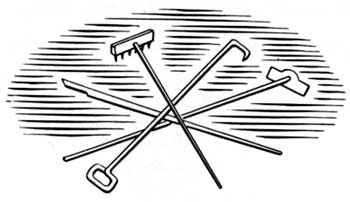|
HOPEWELL VILLAGE National Historic Site |
 |
Contents
a. ESTABLISHMENT OF THE EARLY AMERICAN IRON INDUSTRY
b. COLONIAL IRON INDUSTRY IN PENNSYLVANIA
c. THE IRON PLANTATIONS
d. THE TECHNIQUE OF COLONIAL IRON MANUFACTURE
e. WILLIAM AND MARK BIRD AND THE FOUNDING OF HOPEWELL FURNACE
f. MARK BIRD'S SERVICES IN THE REVOLUTIONARY WAR
g. THE POSTWAR YEARS
h. HOPEWELL IN THE EARLY NINETEENTH CENTURY
i. HOPEWELL'S DECLINE
j. THE BROOKES AND THE BUCKLEYS
k. CLEMENT BROOKE
l. GUIDE TO THE AREA
m. HOW TO REACH THE SITE
o. ABOUT YOUR VISIT
p. ADMINISTRATION
q. ASSOCIATED AREAS
r. SUGGESTED READINGS

For additional information, visit the Web site for
Hopewell Furnace National Historic Site
or view their Official National Park Handbook (#124):

Historical Handbook Number Eight
1954
This publication is one of a series of handbooks describing the historical and archeological areas in the National Park System administered by the National Park Service of the United States Department of the Interior. It is printed by the Government Printing Office and may be purchased from the Superintendent of Documents, Washington 25, D.C. Price 25 cents
The National Park System, of which Hopewell Village National Historic Site is a unit, is dedicated to conserving the scenic, scientific, and historic heritage of the United States for the benefit and enjoyment of its people.
UNITED STATES DEPARTMENT OF THE INTERIOR
Stewart L. Udall, Secretary
NATIONAL PARK SERVICE
Conrad L. Wirth, Director


|
|
Last Modified: Mon, Dec 2 2002 10:00:00 am PDT |


